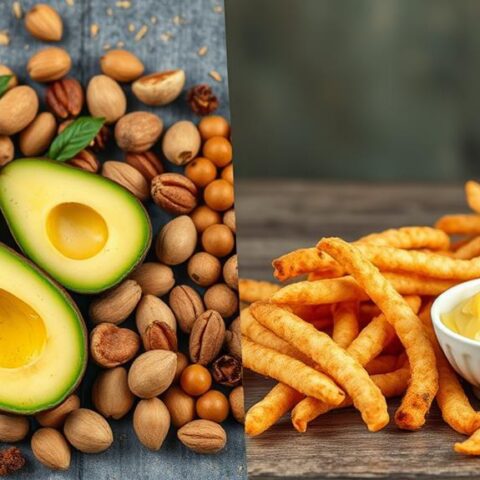
Spam can be considered keto-friendly because it contains only 1 gram of net carbohydrates per serving, aligning with the ketogenic diet's low-carb requirement. Its high-fat content, amounting to 22 grams per can, supports the diet's aim of maintaining ketosis, which aids in fat-based energy use. However, it falls under "Dirty Keto" due to processed ingredients like sugar and sodium nitrite, which could pose health risks. Though Spam offers versatility in low-carb cooking, mindful attention to its additives is essential for ideal health outcomes. For those intrigued, exploring healthier alternatives may offer further insights.
Key Takeaways
- Spam has low carbohydrate content, with only 1 gram of net carbs per 2-ounce serving.
- Its high-fat content supports maintaining ketosis, a key goal of the ketogenic diet.
- Spam provides moderate protein intake, aligning with ketogenic dietary requirements.
- Classic and Bacon variants have minimal carbs, making them suitable for keto diets.
- Versatile cooking methods allow Spam to be incorporated into various keto recipes.
Understanding Spam's Nutritional Profile
Delving into Spam's nutritional profile reveals its potential compatibility with ketogenic diets due to its low carbohydrate content. With only 1 gram of net carbs per 2-ounce serving, Spam presents itself as a low-carb option, aligning with the macronutrient requirements of Keto Foods.
A standard can of Spam offers approximately 270 calories, comprising 22 grams of fat and 16 grams of protein, fitting the high-fat, moderate-protein intake favored by keto enthusiasts. Additionally, Spam's high-fat content can contribute to maintaining ketosis, the metabolic state essential for effective weight loss on the keto diet.
Despite its low carb appeal, Spam is classified as "Dirty Keto," primarily due to its status as processed food. The ingredient list—pork with ham, salt, water, modified potato starch, sugar, and sodium nitrite—contributes to its minimal carb count but raises health concerns regarding additives.
These components, particularly sodium nitrite and sugar, may not align with a clean keto philosophy, which emphasizes whole, unprocessed foods. Likewise, while flavors like Classic and Bacon maintain similar low-carb profiles, variants such as Teriyaki contain higher net carbs (5 grams per serving), necessitating careful selection for those adhering strictly to ketogenic guidelines.
Carb Content and Keto Compatibility
Spam's minimal carbohydrate content plays a vital role in its suitability for keto diets. With only 1 gram of net carbs per 2-ounce serving, Spam maintains a low per net carbs profile that aligns with the ketogenic diet's emphasis on reducing carbohydrate intake. This makes it a keto-friendly option for those seeking to keep their carb count in check.
However, it is essential to make sure that one selects the appropriate variety, as certain flavors like Teriyaki Spam can have up to 5 grams of net carbs due to added sugars. The ketogenic diet supports significant weight loss, making low-carb options like Spam beneficial for achieving such health goals.
- Low Carb Variants: Classic and Bacon Spam are examples with 1-2 grams of net carbs, ideal for keto dieters.
- High Carb Caution: Teriyaki Spam, with 5 grams of net carbs, may not be suitable for strict keto plans.
- Dirty Keto Concerns: Despite being low in carbs, Spam's additives like sodium nitrite require caution.
While Spam's carb content makes it appealing for a low-carb lifestyle, it falls under the "Dirty Keto" category due to unhealthy additives like sodium nitrite and modified starch. Monitoring ingredient lists is essential to ensuring that Spam remains compatible with one's keto goals.
Versatile Cooking Methods
Cooking Spam offers a variety of methods that can improve its appeal and nutritional compatibility with a ketogenic diet. This canned meat, known for being low in carbs per serving, can be prepared through diverse techniques that enhance both its texture and flavor profile.
Frying Spam is a popular method, as it transforms the initial sliminess into a crispy exterior, thereby improving its palatability. This crispy texture makes it an excellent addition to keto-friendly salads or vegetable dishes, where it can provide a satisfying balance to fresh greens or low-carb vegetables.
In breakfast recipes, diced Spam serves as an effective substitute for bacon, adding both protein and a savory depth to scrambled eggs or omelets. This not only aligns with keto dietary restrictions but also introduces a unique taste variation.
Furthermore, due to its zero carb content, Spam can be combined with various keto protein sources like eggs and cheese for a balanced meal.
Grilling Spam is another versatile option, infusing it with a smoky flavor ideal for outdoor meals, such as camping or picnics. Additionally, incorporating Spam into casseroles or as a pizza topping can offer a novel twist to traditional recipes while maintaining their keto-friendly status.
These diverse cooking methods make Spam a flexible and appealing choice for those adhering to a ketogenic lifestyle.
Health Considerations and Additives
While Spam is often lauded for its low carbohydrate content, the health implications of its additives warrant a closer examination. A typical 2 oz serving of Spam contains merely 1 g of net carbs, making it an attractive option for those adhering to a low-carb, ketogenic diet.
However, the classification of Spam as "Dirty Keto" stems from concerns about its processed ingredients, including sugar, sodium nitrite, and modified starch. These additives raise significant health evaluations that should not be overlooked by health-conscious individuals.
Since the keto diet emphasizes the quality of fats consumed, it is crucial to assess the types of fats and additives in processed foods like Spam.
- Sugar Content: Despite the low net carbs, the inclusion of sugar, a high-glycemic sweetener, can interfere with ketosis by elevating blood sugar levels.
- Sodium Nitrite: This preservative, commonly used in processed meats, is linked to potential health risks, including an increased risk of certain cancers.
- Modified Potato Starch: As a thickening agent, this additive may not align with a clean ketogenic lifestyle due to its processed nature.
While Spam's low carb count may fit a keto-friendly diet, the presence of these additives underscores the necessity of evaluating overall health considerations.
Choosing minimally processed alternatives could enhance dietary quality and promote better health outcomes.
Exploring Keto-Friendly Alternatives
For individuals committed to a ketogenic lifestyle, exploring a variety of keto-friendly alternatives to processed meats such as Spam is vital for optimizing health benefits.
While Spam offers low net carbs, approximately 1 gram per 2-ounce serving, it is categorized as Dirty Keto due to processed additives like sugar and sodium nitrite. These ingredients can undermine the long-term health goals associated with a clean keto diet.
Additionally, long-term risks such as potential fatty liver disease and increased liver enzymes highlight the significance of choosing cleaner options. Healthier options such as wild-caught sardines present a compelling alternative, offering zero carbs, 7 grams of fat, and 20 grams of protein per can. This nutrient-dense choice is devoid of processed additives, making it ideal for those seeking cleaner keto-friendly alternatives.
Similarly, canned corned beef, despite potentially containing sugar, can be included in a keto diet if consumed mindfully, as it generally contains less than one total carb per serving.
Other keto-friendly alternatives like potted meat and Vienna sausages offer convenience with low carb counts. However, individual taste preferences may vary, necessitating personal experimentation to identify suitable choices.
Evaluating ingredient lists and nutritional content remains essential for ensuring adherence to dietary goals while minimizing exposure to processed additives.
Frequently Asked Questions
Can You Eat Spam on a Keto Diet?
Spam can be consumed on a keto diet by focusing on portion control and strategic meal planning. Despite its low-carb content, moderation is advised due to limited nutritional benefits and the need for healthier cooking methods.
What Meat Is Best for Ketosis?
For ideal ketosis, select meats high in healthy fats and low in carbohydrates. Prime examples include fatty cuts like ribeye steak and pork belly. Grass-fed beef, fatty fish, and high-fat ground meats also serve as excellent protein sources.
Can I Eat Spam on a Diet?
Spam can be included in a diet through moderation and portion control, especially in weight management efforts. Although Spam recipes offer convenience, its nutritional value is compromised by additives, highlighting the importance of balancing processed and whole food consumption.
Does Spam Have Carbs?
Spam nutrition reveals that it contains carbohydrates, with classic varieties offering 1 g of net carbs per 2 oz serving. Evaluating Spam ingredients and considering Spam alternatives can guide health-conscious consumers in making informed dietary choices.
Conclusion
Spam can be considered keto-friendly due to its low carbohydrate content, aligning well with ketogenic dietary requirements. Its versatility in cooking methods allows for varied meal preparation, enhancing its appeal for those adhering to a keto diet. However, potential health considerations arise from the presence of additives and high sodium content in Spam, necessitating mindful consumption. Exploring keto-friendly alternatives may offer healthier options while maintaining the desired macronutrient balance essential for a ketogenic lifestyle.










No Comments